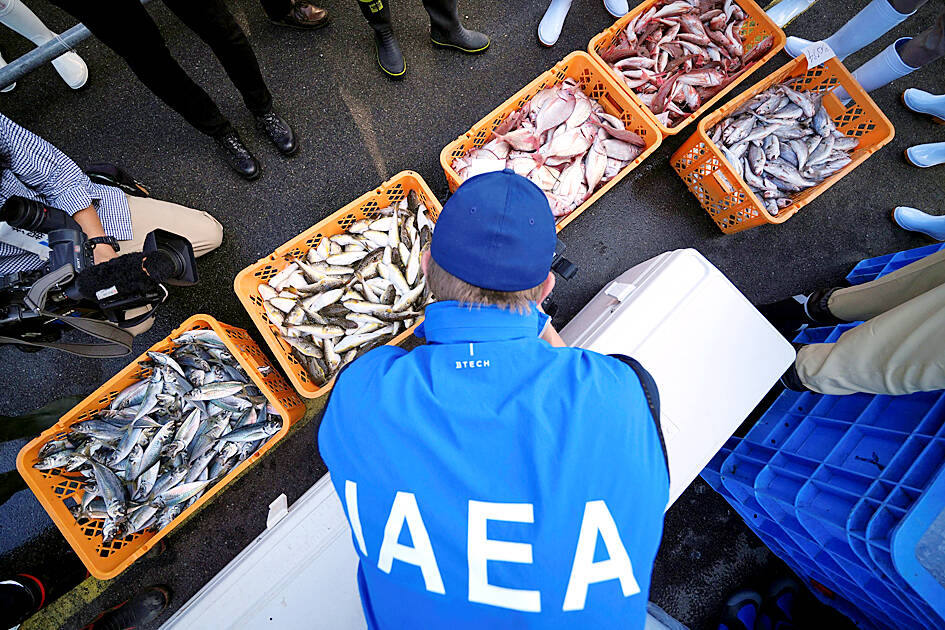The Food and Drug Administration (FDA) on Wednesday announced that almost all produce from five Japanese prefectures affected by the 2011 Fukushima Dai-ichi nuclear power plant disaster would now be allowed into Taiwan.
The five are Fukushima, Gunma, Chiba, Ibaraki and Tochigi.
The only items that would still be blocked from being imported into the nation are those that are still banned from being circulated in Japan, the FDA added.

Photo: Reuters
With the removal of the ban, items including mushrooms, the meat of wild birds and other wild animals, and koshiabura” (foraged vegetables) would now be permitted to enter Taiwan, along with the other produce permitted since 2022.
All food items imported from the five prefectures must be accompanied by radiation and origin certificates and undergo batch-by-batch inspections, FDA Deputy Director-General Lin Chin-fu (林金富) said.
The amendment to the regulations permitting the imports was made known to the public 60 days ago to allow for feedback.
The FDA did not receive any comments of note during the period, Lin said.
Seafood, mushrooms, tea, dairy products and baby food imports from areas outside the five prefectures would only be required to present origin certificates. Radiation certification would no longer be necessary.
Taiwan banned all food imports from the five prefectures for almost 11 years following the disaster in Fukushima.
Japanese Minister of Agriculture, Forestry and Fisheries Tetsushi Sakamoto said he “welcomes the move as a positive step toward promoting the recovery of disaster-hit areas.”
The ministry statement said it would continue to push for all remaining restrictions to be lifted.
“The Japanese government has used multiple opportunities to assure the Taiwan authorities of the safety of our products based on scientific evidence, but we will continue our persistent efforts so that import restrictions such as certificate submission can be scrapped swiftly,” it said.

Taipei, New Taipei City, Keelung and Taoyuan would issue a decision at 8pm on whether to cancel work and school tomorrow due to forecasted heavy rain, Keelung Mayor Hsieh Kuo-liang (謝國樑) said today. Hsieh told reporters that absent some pressing reason, the four northern cities would announce the decision jointly at 8pm. Keelung is expected to receive between 300mm and 490mm of rain in the period from 2pm today through 2pm tomorrow, Central Weather Administration data showed. Keelung City Government regulations stipulate that school and work can be canceled if rain totals in mountainous or low-elevation areas are forecast to exceed 350mm in

EVA Airways president Sun Chia-ming (孫嘉明) and other senior executives yesterday bowed in apology over the death of a flight attendant, saying the company has begun improving its health-reporting, review and work coordination mechanisms. “We promise to handle this matter with the utmost responsibility to ensure safer and healthier working conditions for all EVA Air employees,” Sun said. The flight attendant, a woman surnamed Sun (孫), died on Friday last week of undisclosed causes shortly after returning from a work assignment in Milan, Italy, the airline said. Chinese-language media reported that the woman fell ill working on a Taipei-to-Milan flight on Sept. 22

COUNTERMEASURE: Taiwan was to implement controls for 47 tech products bound for South Africa after the latter downgraded and renamed Taipei’s ‘de facto’ offices The Ministry of Foreign Affairs is still reviewing a new agreement proposed by the South African government last month to regulate the status of reciprocal representative offices, Minister of Foreign Affairs Lin Chia-lung (林佳龍) said yesterday. Asked about the latest developments in a year-long controversy over Taiwan’s de facto representative office in South Africa, Lin during a legislative session said that the ministry was consulting with legal experts on the proposed new agreement. While the new proposal offers Taiwan greater flexibility, the ministry does not find it acceptable, Lin said without elaborating. The ministry is still open to resuming retaliatory measures against South

1.4nm WAFERS: While TSMC is gearing up to expand its overseas production, it would also continue to invest in Taiwan, company chairman and CEO C.C. Wei said Taiwan Semiconductor Manufacturing Co (TSMC) has applied for permission to construct a new plant in the Central Taiwan Science Park (中部科學園區), which it would use for the production of new high-speed wafers, the National Science and Technology Council said yesterday. The council, which supervises three major science parks in Taiwan, confirmed that the Central Taiwan Science Park Bureau had received an application on Friday from TSMC, the world’s largest contract chipmaker, to commence work on the new A14 fab. A14 technology, a 1.4 nanometer (nm) process, is designed to drive artificial intelligence transformation by enabling faster computing and greater power